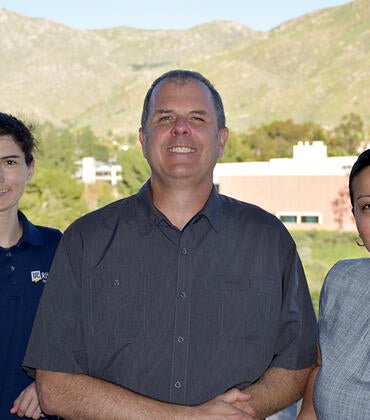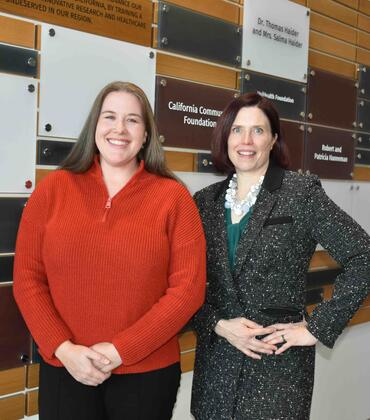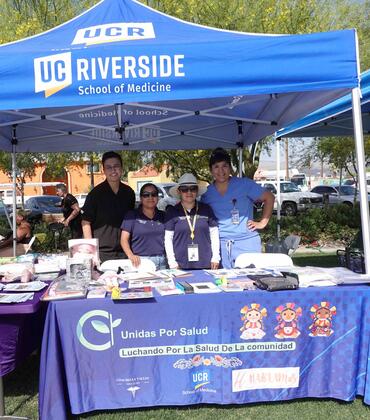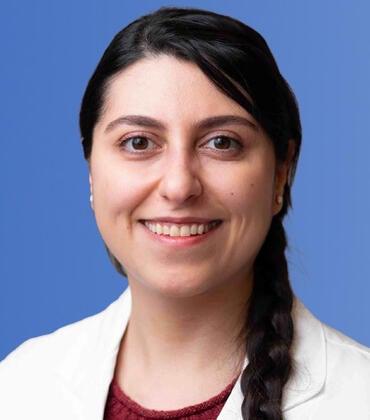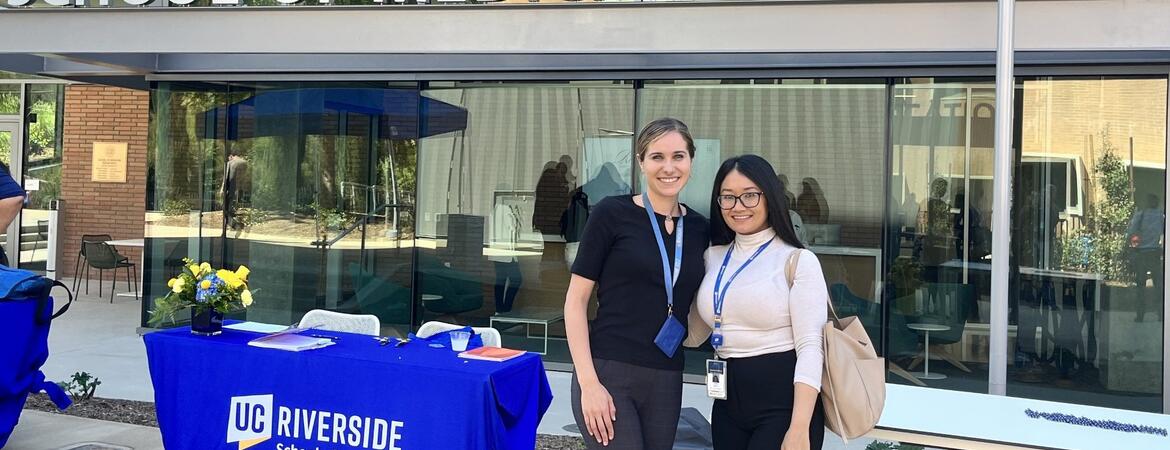
Growing up in Moreno Valley, Carla Urmeneta witnessed local health issues like poor air quality in her hometown. After earning her MBA in healthcare administration and management from Cal Baptist University, she was accepted into the UCR School of Medicine’s Administrative Fellowship program, allowing her to learn more about regional health challenges while working with her home community to address them. When her fellowship ended, she was hired by the SOM Center for Healthy Communities and is now a senior financial and administrative analyst in the Division of Biomedical Sciences.
“The fellowship not only opens doors for you, it helps you network, and it also helps you see what you want to do,” said Urmeneta, who entered the program set on working in administration but changed her career focus to finance after seeing other options as a fellow. “That's also another added bonus of the fellowship, that you're not just stuck in one area; you rotate in all these different departments and you get to see the different phases of academic medicine,” she added.
Urmeneta’s path represents the ideal outcome of the fellowship program, which was launched by former Chief Financial Officer Louise Borda in 2018. Like the school’s Administrative Internship program for college students, it aims to expand participants’ career paths while training people who will support local community health through the SOM and beyond.
“Louise’s goal was to bring in people who had connections to the Inland Empire and get them working for the School of Medicine,” recalled fellowship program co-founder Rosemary Tyrrell, EdD, director of the Office of Faculty Development and a health sciences assistant clinical professor at the SOM. “She felt if we drew from the community, then they would be more likely to stay and be part of the School of Medicine rather than leaving.”
A unique program
The one-year administrative fellowship program has graduated 12 fellows so far, with four of them remaining as UCR employees after their fellowship ended. “I love seeing them here,” said Tyrrell. Still, she said she takes pride in the ones who find employment elsewhere, too. “I call that a success story, that they got so much benefit out of the fellowship program that they got a job offer that was so lucrative we couldn't even match it,” she said.
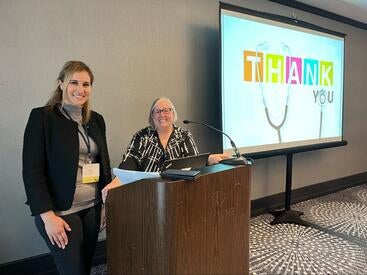
The fellowship, which accepts up to two participants each year, is unique from similar programs in that it focuses on medical school administration (such as financial aid) rather than clinical administration at a hospital. The program’s four rotations include one at UCR Health to ensure that fellows obtain some clinical experience, but Tyrrell emphasized that it’s not the focus. Currently, the fellowship’s other four-month rotations include the Office of Faculty Development, Business Operations, and the Pathway Programs Office.
Tyrrell noted the program’s value both for the school and the fellows themselves. “The fellows don’t cost the school that much, and we're getting their services, and then we're training someone who is mission oriented who has an interest in staying here and not moving on to a bigger UC,” she explained. “You're getting someone who's pretty advanced, and you can train them in a way where they see if this is what they want, and we see if we want them.”
Besides rotations in four different departments to cover a variety of job experiences, the fellowship involves monthly learning sessions and opportunities for informational interviews with current SOM employees. While all fellows must have earned their master’s degree before starting the program, Tyrrell said the intent of the fellowship is to provide job experience opportunities to people who lack the two years of work experience required for many entry-level roles. “I always joke that it's the only hiring committee I've ever been on where having experience counts against you,” said Tyrrell with a laugh.
Since the one-year program is still insufficient for fellows to meet the minimum work requirement for positions at the SOM, though, Tyrrell said that exceptional fellows can complete a second year in the program, qualifying them to apply for jobs at UCR. She added that she hopes to expand the fellowship to a standard two-year program to resolve this issue.
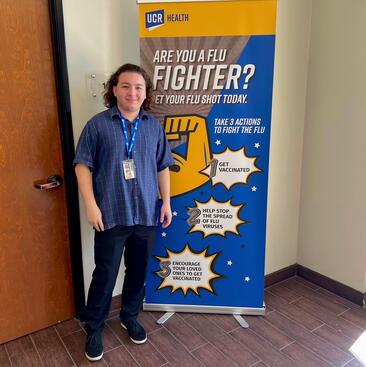
Current 2024 fellow Angel Pruneda graduated from his master’s program with only nine months of work experience–insufficient to apply for many roles. Instead, he joined the SOM’s fellowship program. “I like that they're still teaching you, they're still showing you exactly what the role in the real workforce requires, and you're also getting experience with it,” he said.
While he learned relevant job skills in school, Pruneda said his academic experiences didn’t always apply to the workforce. “The most valuable experience in the fellowship has probably been getting more project manager experience,” he said. “We do it in school, but it doesn't always transition correctly over to work,” he continued, explaining that there are no professors to consult when real-world work teams hit a roadblock. “Everybody has to work together for your project to run smoothly.”
Pruneda said he has also benefited from collaborating with a former fellow who still works for the SOM, Arpy Barsemian, senior performance excellence project manager in the Department of Clinical Affairs. “It's great because I have somebody who understands what I'm going through who can help guide me,” he said.
For Barsemian’s part, “Thinking back to when I was a fellow, I try to provide guidance whenever needed,” she said. “It's really nice to see, because I've been in his shoes.”
Working to serve the Inland Empire
Barsemian decided to join the fellowship program in part because she felt aligned with the SOM’s mission to improve healthcare for underserved patients, like her grandparents in Syria whom she often visited growing up. “I remember seeing the Syrian community not getting the health care that they needed, and there were definitely health disparities and access to healthcare issues,” Barsemian said, adding that she noticed similarities among patients in the Inland Empire. “Working in the IE gives me the opportunity to make an impact on the patients in the Inland Empire region.”
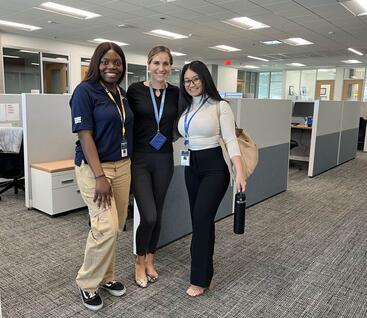
She said she enjoyed getting different experiences, many of which she still draws on in her current position. “I liked that I did gain a lot of project management experience when I was rotating at UCR Health…as well as in Business Operations, the Center for Healthy Communities, and the Office of Faculty Development,” she said, with another highlight being her first conference presentation with Tyrrell at a Western Group on Educational Affairs conference in Oregon. “Different skill sets, different projects, different preceptors, in different teams; adjusting to that kind of felt like a new job every time I made my rotation,” she added. “I definitely felt that I was much more prepared after finishing the administrative fellowship.”
Barsemian added that the fellowship gave her the opportunity to connect with a variety of people at the SOM and UCR Health. “I've met and formed relationships throughout my fellowship and beyond, and that's really helped build trust and makes me feel like I belong and I want to continue contributing to the mission,” she said. Her network was also valuable, she added, when she had questions for people in different departments or looked for mentors, one of whom is Tyrrell. “That also really helped propel my career forward, and helped me develop my skills more, and I was able to add more value,” she said.
Internship pathway
In addition to the administrative fellowship program, the administrative internship program in the SOM’s Center for Healthy Communities provides a pathway for current college students to gain public health experience and potentially pursue a career at the SOM.
“This program is an excellent opportunity for individuals to develop real-world skills in community health engagement and intervention programming,” said Michelle Burroughs, the director of community engagement and outreach at the Center for Healthy Communities who also oversees the internship program. “It highlights the importance of working collaboratively with communities to improve health outcomes and reinforces the significance of disseminating results back to those communities."
About 64 college students, mostly from local schools, have completed the internship program for college credit, with at least one, Selina Hernandez, HDR/CHC community relations specialist, returning to work at the SOM.
The program is unique because interns build experience working directly with community members, according to Shaleta Smith, an executive administrative specialist at the SOM who helps run the program. “We do welcome our interns out in the community, and they get that real life interaction with working with the unhoused population and the underserved community,” she explained. “We try to give them the best experience to help them grow.”
Interns also complete projects to help educate local residents about public health. One former intern developed a series of short public health videos, called the LIT Project, which current interns still contribute to. “We really do treat them like they're staff; their ideas matter,” Smith said. “We make sure they feel like they're part of the team.”
Even though most interns pursue careers outside of UCR, the internship program, like the fellowship program, directly contributes to the SOM’s mission to improve healthcare in the region. Smith noted that many former interns have earned a master’s degree in public health, with some even pivoting their training to focus on public health. “We have helped a lot of students decide their future careers,” Smith said. “That's always fascinating to me, because we're changing lives.”
Furthermore, Smith reported that many former interns remain local for their health work, another essential aspect of the SOM’s mission. “They want to give back to this area,” she said.
Both the administrative internship and administrative fellowship programs offer career opportunities while providing value to the SOM and increasing participants’ long-term commitment to the local community. “It’s a self-perpetuating program, because the more we can retain the fellows, the more we can benefit from it,” said Tyrrell of the fellowship program. “They bring a lot of value, and it's our hope that we will recruit them and retain them here, because we spend all that time and resources training them,” she added. “So let's try and keep them here.”
